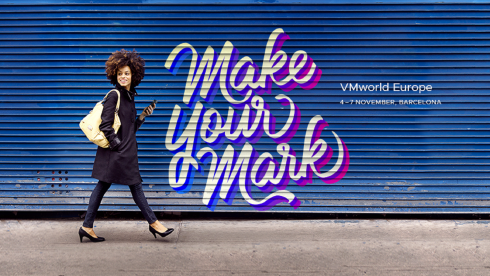DISCLAIMER: this article is older than one year and may not be up to date with recent events or newly available information.
It is 110 years since the first of what would become International Women’s Day took place. While much has been achieved, based on current rates of progress it will be almost as long before we see true gender parity, according to the World Economic Forum’s Global Gender Gap.
That study underlines the scale of the work involved. Depending on the industry they work in, some people may feel that it’s even further apart. Technology would be one such sector that has historically struggled to attract a diverse range of candidates, as VMware’s head of marketing in MENA, Thoraya ElGhawi, can attest, who started her career at a company in the Middle East on a sales trainee program. “It was clear to me from the moment I joined that there was a large disparity between the number of women versus men in the company.”
It’s something that Svenja Habenschaden, director of marketing for the DACH region at VMware, can sympathise with. “When I started 25 years ago, my employer’s workforce was three percent female.”
An evolving industry
Now, however, they see an industry in the midst of an evolution. Svenja has noticed that “women are no longer hesitant to apply for IT or tech roles. More importantly, we’re building a future pipeline; women are taking technology subjects at school and university and focusing on quite technical studies.”
It is something that she is passionate about. As well as marketing, she is also responsible for managing diversity initiatives in Germany for VMware and was recently recognised for her work when she won Outstanding Diversity Commitment at the 2019 Women’s IT Network Awards. “I was over the moon for the recognition that the award means for the entire Germany team. We’ve put a lot of effort into extending diversity and inclusion into our organization, and it was fantastic to have external validation of the work we’ve all done.”
The work of the likes of Women’s IT Network in Germany and the Everywoman network globally are, along with corporate diversity and inclusion programs, having an impact on the increasing diversity of technology workforces, says Thoraya. “They have advocated the importance of hiring, building and accelerating women’s careers. We’ve taken great strides in the industry towards providing women with a platform to get their voices heard and equip them with the skills needed to grow and thrive within their environments.”
Policies aren’t enough
Thoraya may have highlighted company programs as a factor in increasing women in the technology workplace, but she is quick to point out that “equality is not just about perks and policies extended to women. I’ve worked at companies that have no policies whatsoever to support and accelerate women’s careers, and ones that have had lots. But what they both have in common is that most women ended up leaving because of the culture, ideas not being credited and not having a seat at the table. Policies are a way forward to start addressing gender diversity, but companies will fail to retain women if all they have are policies.”
Svenja agrees. “Unless you live it and breathe it, you are not going to see effective results. You need to be the example for your organisation, and that starts with recruiting and hiring.”
Having the right allies on your side
That sense of the right culture demonstrates how improving diversity and inclusion is not the preserve of one gender, or one specific group. This year’s theme for International Women’s Day is #EachforEqual – the idea that we’re all responsible for our own thoughts and actions. As part of this, there is the concept of collective individualism, the sense that we are all parts of a whole, and that the way we act can have an impact on our larger society.
While it is incumbent on everyone to take responsibility for their actions and how they support diversity and inclusion, having allies is also important to ensure that the right culture is in place. Svenja sees a good ally as someone “that understands the topic, is actively interested in learning more in the areas that they lack knowledge and communicates what they do know, and their support, within the organization.”
Duncan Greenwood is Vice President and General Manager for Northern EMEA at VMware and heads up the company’s diversity and inclusion efforts. He recently won the award for Male Agent of Change at the 2020 FDM Everywoman Technology Awards, a win that he sees as recognition for the difference made by the initiatives VMware has implemented over the last 12 months. To Duncan, being an ally requires three things: “The ability to see every individual as unique, accepting that everyone’s story is different, and compassion, for both yourself and others.”
He is also conscious of the work that still needs to be done. “Whilst we will continue to challenge ourselves at VMware and drive high impact initiatives to accelerate change, I believe there is even more work to do at the grassroots – an equal society starts with equal education. The eighties and nineties saw a female surge in science, technology, engineering and mathematics, but over the last seven years, the number of women studying engineering and physics at university has barely changed. Even when women do take STEM subjects at university, their dropout rate from industry roles tracks much higher than men’s. So, we also need to increase the focus on retaining young female talent starting their careers.”
#EachforEqual at VMware
There’s also the education that businesses can do themselves. “Many businesses realize the importance of equal opportunities, and you can see that in their policies and commitments to increase female participation at all levels of the business,” acknowledges Thoraya. “But without educating men around unconscious bias, getting them to endorse women’s achievements and embracing diversity, equality will only be a myth.”
That drive needs to come from the top down, says Svenja. “There needs to be a structure, a platform that actively supports everyone to engage and exchange ideas with both peers and management.”
It’s a concept Duncan wholeheartedly supports. “One of the things I love about VMware is our values. They’re lived and breathed from the CEO down, and we are all encouraged to hold each other accountable to these values.”
For him, #EachforEqual “is a great collective rally cry. Although it’s being used for gender equality, it can be applied much more broadly. For me, it means every single one of us taking responsibility for the way we think and act. Don’t be the innocent bystander! Those collective thoughts and actions have the power to drive equality in the workplace, government, our education system, sports and beyond.”
Category: News & Highlights
Tags: diversity, women's day



No comments yet